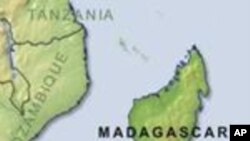<!-- IMAGE -->Fitful efforts to restore constitutional order in Madagascar appear to have stalled once more as the island nation’s political leaders remain divided over the formation of a consensual and inclusive transition government to rule until hoped-for presidential elections by the end of 2010.
The crisis came to a head in March, when then-President Marc Ravalomanana was forced to resign amid street protests over his rule led by opposition groups and a mutiny within the Malagasy military. President Ravalomanana handed political power over to the military, which in turn conferred authority to opposition leader Andry Rajoelina, who proclaimed himself transition president.
President Ravalomanana fled and the international community condemned Rajoelina's move as a coup d’etat. Following the coup d'état, Madagascar has become increasingly isolated from the international community, significant non-humanitarian foreign assistance has been suspended, and the political turmoil has wreaked havoc on its economy, particularly its $390-million-a-year tourism industry.
In August 2009, a power-sharing agreement was negotiated between Rajoelina, Ravalomanana and 2 former presidents with the help of the former president of Mozambique, Joaquim Chissano. Among a plethora of other critical issues that would help lead Madagascar back to democratic and constitutional governance, the 4 political movements agreed to form a consensual and inclusive transitional government leading to free and fair elections in 2010. This agreement deadlocked over political disputes, which led Rajoelina to instruct his government's prime minister to name his own cabinet, in violation of the agreement reached in Maputo.
The United States has worked impartially with all parties to find a resolution to this crisis that is consensual and inclusive of all political voices. The U.S. continues to encourage all parties to respect and reaffirm their commitment to the Maputo process, warning that unilateral actions by any interest jeopardize progress achieved so far and any peaceful resolution going forward.
The crisis came to a head in March, when then-President Marc Ravalomanana was forced to resign amid street protests over his rule led by opposition groups and a mutiny within the Malagasy military. President Ravalomanana handed political power over to the military, which in turn conferred authority to opposition leader Andry Rajoelina, who proclaimed himself transition president.
President Ravalomanana fled and the international community condemned Rajoelina's move as a coup d’etat. Following the coup d'état, Madagascar has become increasingly isolated from the international community, significant non-humanitarian foreign assistance has been suspended, and the political turmoil has wreaked havoc on its economy, particularly its $390-million-a-year tourism industry.
In August 2009, a power-sharing agreement was negotiated between Rajoelina, Ravalomanana and 2 former presidents with the help of the former president of Mozambique, Joaquim Chissano. Among a plethora of other critical issues that would help lead Madagascar back to democratic and constitutional governance, the 4 political movements agreed to form a consensual and inclusive transitional government leading to free and fair elections in 2010. This agreement deadlocked over political disputes, which led Rajoelina to instruct his government's prime minister to name his own cabinet, in violation of the agreement reached in Maputo.
The United States has worked impartially with all parties to find a resolution to this crisis that is consensual and inclusive of all political voices. The U.S. continues to encourage all parties to respect and reaffirm their commitment to the Maputo process, warning that unilateral actions by any interest jeopardize progress achieved so far and any peaceful resolution going forward.




